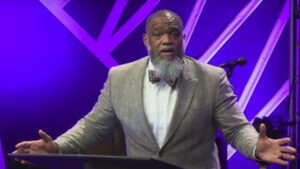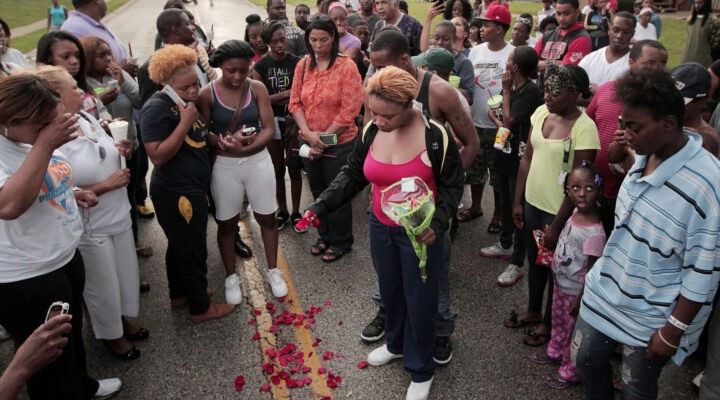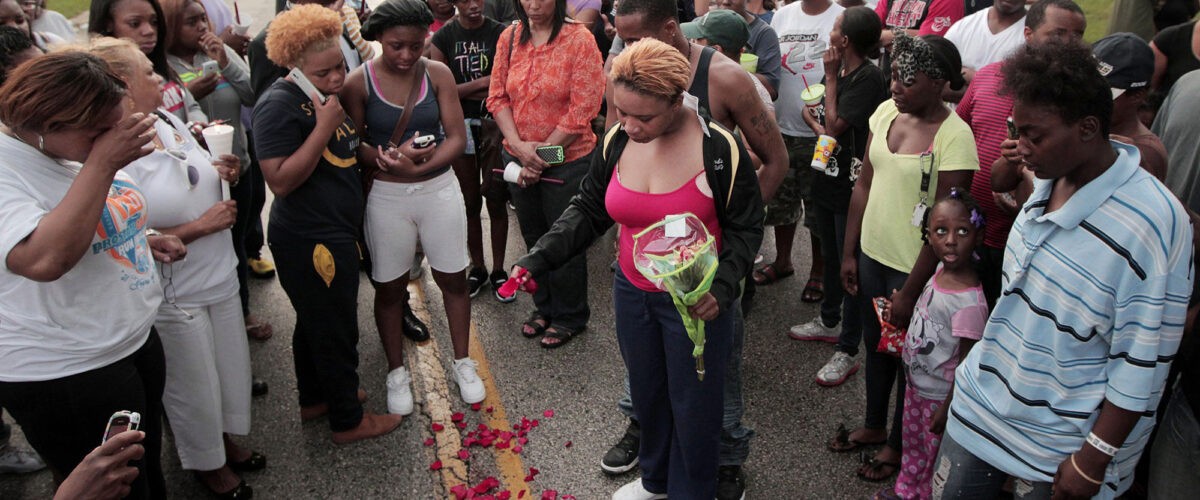I’ve learned recently that the value of a disagreement in 2022 is fairly low, nearly completely devoid of any real value at all. This is due mostly to the constant stream of information for which we are able to, and sometimes expected to, give an opinion — especially on social media.
Lately when coming across a post or article I disagree with, I’ve started to wonder, “Will what I think matter at all to this person who I don’t know and may never meet in real life?” Or, “Does my opinion matter to the guy I went to college with who only shows up on my page to argue his points in paragraph form?” I’m looking at you, Rell. And for the most part, the answer is a resounding, “No.” What I think about the topic of the day doesn’t amount to very much at all.

Brent Barnett
So when I had the opportunity to write about someone who I have strong opinions about, conservative pastor Voddie Baucham, I had to take a moment to think about how I really felt about him, what my main and most pressing grievance with him is, and if it would matter at all to share these thoughts in a public forum. I found an answer in the words of the great James Baldwin who said, “We can disagree and still love each other unless your disagreement is rooted in my oppression and denial of my humanity and right to exist.”
This is why I knew it was important to share my concerns about Pastor Baucham, because his theology and worldview shoot to the very heart of my right to exist as a Black man in America, as a Christ follower, and as one who believes our theology always should be evolving to reflect our finite understanding of our infinite God.
A positive first impression
I first encountered Voddie Baucham about four years ago through a video titled “The Mediocrity of Christian Men in America.” Baucham argues there that the standard for Christian men has been set so low that a young man who displays a seriousness for the things of God will be immediately pushed toward pastoral/preaching ministry. He goes on to attribute this to a desire from other men in the church to create distance between the casual and the serious, as to not make those men feel guilty about “their mediocre pursuits.”
Baucham states: “Modern American Christianity is the only place in our culture where we will tolerate this cognitive dissonance between a man who will say, ‘I’ve been walking with God 30-40-50 years, and I know nothing.’”
This resonated with me because it is my experience both personally and in community. I was that young man who displayed a seriousness about God early on and felt the push toward ministry before my character matched my cognition. And I experienced that desire to glean from older men, even pastors and ministry leaders, some of whom ended up being deep and empty wells from whom I could not draw much. I agreed and I felt Baucham’s words on a deep level.
“I agreed and I felt Baucham’s words on a deep level.”
Through the rabbit hole
However, as I followed Baucham down a rabbit hole of his videos and posted work, I quickly came to realize that while we agreed on biblical manhood, at least on a portion of his view of it, we were tragically divergent on other pressing issues.
I found this first divergence in the form of a Fox News clip from 2014 where Baucham unpacks his thoughts on the Mike Brown case, stemming from a blog he wrote for The Gospel Coalition titled, “Thoughts on Ferguson.” As he does in the blog, Baucham began his comments in the interview by immediately de-emphasizing Mike Brown’s death and the subsequent unrest in Ferguson, Mo. He begins his introduction of the blog by saying:

Voddie Buchmann
In early August my wife and I, along with seven of our nine children, left for a month-long ministry tour in Africa (Kenya, Zambia, and South Africa). It was a couple of days before we got settled and had any access to media. As such, I was taken aback when I began to receive Google alerts, emails, and Facebook and Twitter messages either demanding that I comment on “Ferguson,” or condemning me for failing to do so. The only problem was, I had absolutely no idea what they were talking about. Who, what, or where was Ferguson? Why was it such a big deal? Why was I being condemned (along with other “high-profile” evangelicals) for “failing to speak out on such an important issue”?
I eventually got up to speed. Or at least I found out what all the fuss was about. Over the next several weeks I viewed this issue from a unique perspective. I was an American in Africa watching an issue ignite ethnic tensions in my homeland. It was almost surreal.”
“Baucham … was now a ‘gee-golly’ onlooker to one of the most important and pivotal police brutality cases of the past 30 years.”
The Baucham I had been introduced to in the “Mediocre Manhood” video, who seemed to be passionate, astute and even witty, was now a “gee-golly” onlooker to one of the most important and pivotal police brutality cases of the past 30 years. A case that would bring Black Lives Matter into full view on the international stage and one centered around the death of a young man who could’ve been my brother or any one of Baucham’s seven sons.
Baucham erases Brown’s humanity by pointing to an oft-disputed video of Mike Brown hours before his murder, claiming Brown is seen “robbing” a corner store and that Brown is merely a criminal who got what was coming to him: “Minutes later, Brown reaped what he sowed, and was gunned down in the street. That is the sad truth.”
Baucham goes on to use a broom made of Conservative Christian Talking Points to sweep away Mike Brown’s death in three important ways:
- By suggesting that Black Christians value their ethnicity over their membership in the body of Christ (“it worries me that so many Christians view themselves primarily as members of this or that ethnic community more than they see themselves as members of the body of Christ.”)
- Diverting attention from police violence against people of color by pointing to Black-on-Black violence as the real “epidemic”: “There is indeed an epidemic of violence against Black men. However, that violence, more often than not, occurs at the hands of other Black men. In fact, Black men are several times more likely to be murdered at the hands of another Black man than they are to be killed by the police.”
- Reducing racism to merely a “sin issue”, which oversimplifies the threat of racism to our faith and society and leaves us with little practical solution for it outside of seeing all humans as image bearers: “The cops who stopped me were sinners. They were not taking their cues from some script designed to ‘keep me down.’ They were simply men who didn’t understand what it meant to treat others with the dignity and respect they deserve as image bearers of God.”
Baucham’s stances on police brutality, racism and the humanity of those who find themselves interacting with the criminal justice system are beyond problematic and not just because he’s a Black man raising Black children.
“Baucham writes about this in his newest book, Fault Lines, which he often peddles to largely white audiences clamoring to hear a Black man pull the sheets off their favorite liberal boogey-topics.”
I also should mention that Baucham holds many other violent ideologies in his pockets toward the LGBTQ community, toward Critical Race Theory, and toward what he feels is a “looming crisis” in the church, social justice. Baucham writes about this in his newest book, Fault Lines, which he often peddles to largely white audiences clamoring to hear a Black man pull the sheets off their favorite liberal boogey-topics. Nothing to see here, folks.
Proposed for SBC leadership
But these things become even more troubling knowing that Baucham was seriously proposed as a candidate for the presidency of the largest Baptist denomination in the world, the Southern Baptist Convention. While that nomination appears impossible because he is not technically a member of the SBC while living overseas, he now has been announced as a candidate to lead the SBC Pastors’ Conference, also a high-profile role.
If all the dominoes fall correctly, the SBC would install in elected leadership a man who would amplify every racist, homophobic and politically violent element in a denomination that has fought back against becoming a more inclusive version of itself — especially in the past 10 years as racial tensions in America rose to a fever pitch.
The SBC derives its very name of being Southern Baptist because a Baptist missionary was barred from being able to take his enslaved person with him as a missionary to Africa, causing Baptists from the South to split from those in the North.
This theology has undergirded racist and inhumane policies of all kinds by running the Bible through a strictly American, male and conservative lens. And that’s putting it lightly. Very lightly.
Even though the SBC passed a resolution in 1995 that so lovingly denounced the racism at the root of its founding and “the role that slavery played in the formation of the Southern Baptist Convention,” the SBC still harbors the same racist and patriarchal tendencies that caused its members to side with Jim Crow of Alabama instead of Jesus of Nazareth for 150 years.
The SBC has had one Black president, the great Fred Luter, who served two terms as president beginning in 2012. As progressive as Fred Luter was as an SBC leader, he still toed a certain line of traditional theology and conservative thought.
But let’s be clear: If Baucham were to run for the presidency and be elected, his administration would make Fred Luter look like Stokely Carmichael preaching a Pentecost Day sermon in front of a stained-glass painting of Black, dreadlock Jesus while wearing a red, black and green Adidas Liberation tracksuit. Baucham would usher the SBC into a deep, antebellum slumber, erasing any progress made by Luter and other forward-thinking SBC leaders such as Russell Moore.
A dangerous platform
Baucham’s ascension to the SBC presidency or the Pastor’s Conference presidency would be dangerous to many but especially to Black people because he would wield the power to make those white Christians who hold racist ideologies across the country believe their ignorant indignation surrounding Critical Race Theory, social justice and other extremely relevant issues are not only correct, but biblically sound and person-of-color approved.
“He would wield the power to make those white Christians who hold racist ideologies across the country believe their ignorant indignation surrounding Critical Race Theory, social justice and other extremely relevant issues are not only correct, but biblically sound and Person-of-Color approved.”
Because racists see Black people as a monolith, they only need to hear from one of “us” with a dissenting opinion to dismiss every argument for our humanity that we present. Baucham would become white Christian America’s best Black friend, and we’d all be the worse for it.
Someone asked me if I thought Voddie Baucham is a “house negro.” I don’t like that term for many reasons, but I told the person “no.” Not because I disagree with the term but because Baucham is something far more insidious.
The slavery parallel I’d make is that of the overseer, an enslaved person tasked with violently enforcing the rules of the slave master, while being fooled to believe he is better than his enslaved brethren because of his position of power. Given elected office, Baucham would be the SBC’s chief overseer, with the authority to crack a long whip on the backs of marginalized people. He would use his considerable speaking skills, his intellect and command of Scriptures to gaslight millions of people into believing racism is merely a distraction and that they’re being fooled by Satan himself into paying attention to it at all. I have no doubt Baucham would use his platform to protect the oppressors while demonizing the oppressed.
This summer, the SBC will be given a chance to hand Voddie Baucham a large bag of stones — the influence and resources of the world’s largest Baptist denomination. My mind ponders one important question: Would Jesus be standing on the side of Baucham slinging stones or on the side of those who will be hit by the stones?
I believe Jesus would be on Baucham’s opposite side, making sure those stones he throws don’t harm the people Jesus loves, lived for and died for.
Brent Barnett is a former pastor and church planter who now works as an entrepreneur, creative consultant and designer.
Related articles:
Plagiarism is the least thing to worry about with Voddie Baucham, who is a threat to children, women and daughters | Analysis by Rick Pidcock
A surprising nominee for SBC presidency announced in a surprising way


